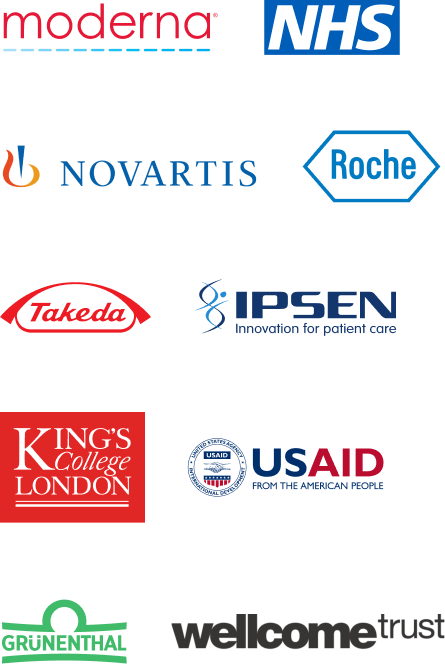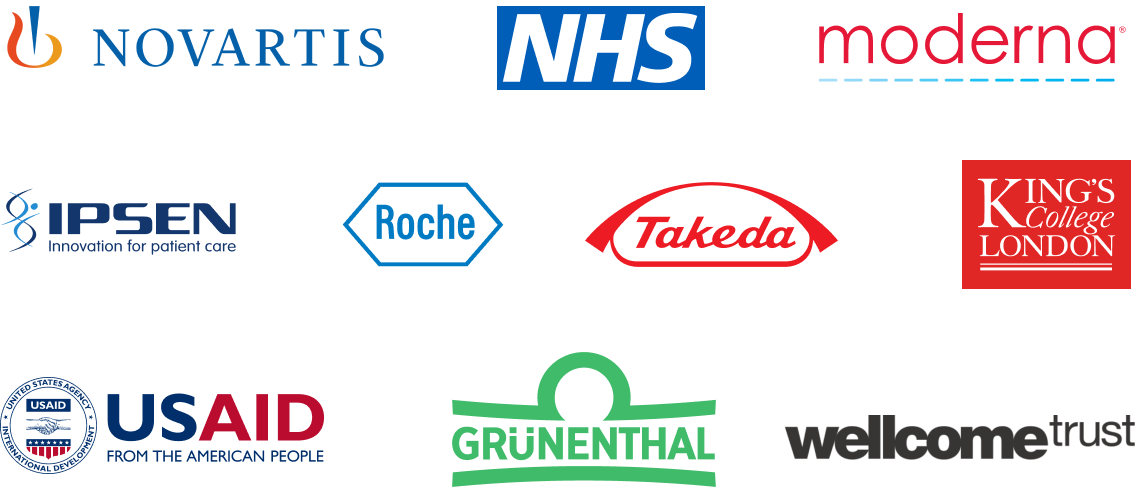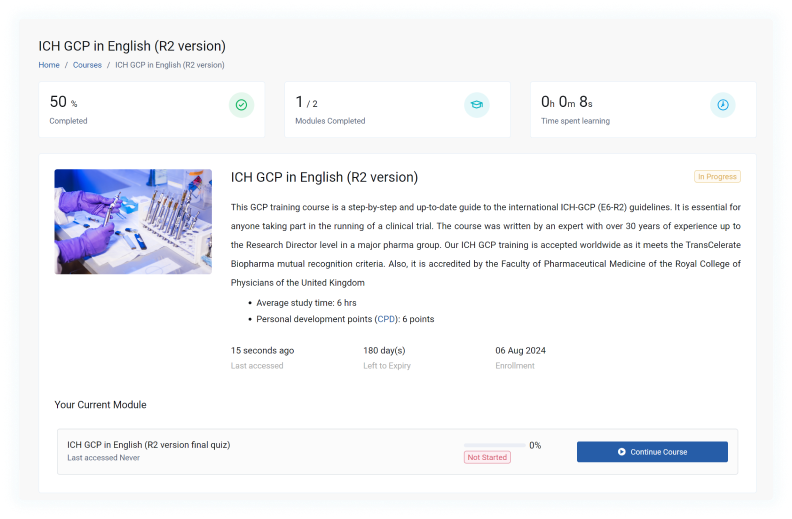Course Syllabus
- What is GCP?
- Why is ICH GCP important?
- The Principles of ICH GCP
- Additional Learning Points
- Documentation and Version Control
- Quality Assurance (QA)
- Key Resources
- Introduction
- Responsibilities of the CA
- Responsibilities of the IEC
- Subject Informed Consent Forms (ICF): Part 1
- Subject Informed Consent Forms (ICF): Part 2
- Composition, Functions, Operations, Procedures, and Records
- Introduction
- Investigator Responsibilities
- Investigator Qualifications and Agreements
- Adequate Resources
- Medical Care of Trial Subjects: Part 1
- Medical Care of Trial Subjects: Part 2
- Communication with IRB/IEC
- Compliance with the Protocol
- Investigational Medicinal Products
- Randomisation Procedures and Un-blinding
- Informed Consent: Introduction
- Informed Consent: The Consent Discussion
- Informed Consent: Subjects Who Cannot Read or Write
- Informed Consent: Minors and “Mentally Incompetent” Subjects
- Informed Consent: Incapacitated Subjects
- Informed Consent: Updating Consent
- Records and Reports: Introduction
- Records and Reports: Study Site Files
- Records and Reports: Updates & Amendments
- Records and Reports: Source Documents
- Records and Reports: Financial Information
- Records and Reports: The Case Record Form
- Records and Reports: Recording Subject Data
- Premature Termination or Suspension of a Trial
- Progress Reports and Final Reports by Investigator
- Archiving
- Introduction
- Quality Management: Part 1
- Quality Management: Part 2
- QA and QC (Quality Assurance and Quality Control): Introduction
- QA and QC (Quality Assurance and Quality Control): Standard Operating Procedures
- QA and QC (Quality Assurance and Quality Control): Agreements & Contracts
- Contract Research Organisations (CROs)
- Medical Expertise
- Trial Design
- Trial Management: Part 1
- Trial Management: Part 2
- Data Processing: Part 1
- Data Processing: Part 2 – Systems Electronic Data
- Record Keeping
- Investigator Selection: Introduction
- Investigator Selection: Permissions
- Investigator Selection: Responsibilities
- Investigator Selection: Compensation
- Financing
- Notification/ Submission to Regulatory Authorities
- Gaining CA Approval in the EU
- Confirmation of Review by IRB/IEC
- Information on IMP
- Manufacturing, Packaging, Labelling, and Coding Investigational Products: Part 1
- Manufacturing, Packaging, Labelling, and Coding Investigational Products: Part 2
- Supplying and Handling Investigational Products
- Record Access
- Audit and Inspection
- Noncompliance
- Premature Termination or Suspension of a Trial
- Clinical Trial/Study Reports
- Multicentre Trials
- Introduction
- Monitoring: Part 1
- Monitoring: Part 2 – The Monitor’s Responsibilities
- Monitoring: Part 3 – The Monitoring Visit
- Monitoring: Part 4 - Verifying IMP
- Monitoring: Part 5 - Complying with the Protocol, Amendments, SOP and Guidance
- Monitoring: Part 6 - Verifying Informed Consent
- Monitoring: Part 7 - The Case Record Form (CRF) and Source Documents
- Monitoring: Part 8 - Verifying Subject Data
- Monitoring: Part 10
- The Monitoring Report & Plan
- Quality Management - Centralised Monitoring
- Fraud and Misconduct
- Introduction
- Adverse Events: Part 1
- Adverse Events: Part 2
- Adverse Events: Part 3
- Adverse Events: Part 4
- Adverse Events: Part 5
- Adverse Events: Part 6
- Introduction
- Protocol Structure and Content
- Introduction
- Investigator Brochure Structure and Content
- Introduction
- Essential Documents
- Archiving
- Documents to be Present Pre-Study
- Documents to be Present During the Study
- Documents to be Present Post-Study
- Glossary & Abbreviations
- Useful Reference Documents
Our GCP certified customers


Good Clinical Practice (GCP) training is a crucial educational programme designed to equip clinical trial professionals and researchers with essential knowledge of ethical and scientific standards. This comprehensive course focuses on the guidelines set forth by the International Council for Harmonisation (ICH), which are globally recognised in the field of clinical research.
The core objectives of GCP training include:
- Safeguarding the rights, safety, and well-being of human participants
- Upholding the reliability and integrity of clinical trial data
- Fostering consistent, high-quality practices throughout all stages of clinical research
Whitehall Training's Good Clinical Practice Course thoroughly covers these vital areas, offering participants a robust understanding of both the theoretical principles and practical applications of GCP. Our course ensures that learners gain the necessary skills to conduct clinical trials in accordance with international standards, promoting excellence in research practices.
For individuals seeking involvement in clinical trials research, obtaining GCP certification is essential.
Those looking to broaden their knowledge of the clinical research landscape will find GCP certification particularly beneficial for several reasons:
- It guarantees adherence to globally recognised standards
- It bolsters the reliability and calibre of research conducted
- It safeguards the rights and well-being of study participants
- It opens up new career opportunities within clinical research
The Whitehall Training Good Clinical Practice Course not only provides the necessary certification but also imparts practical knowledge for effectively implementing GCP principles in your professional role.
Good Clinical Practice (GCP) certification is a crucial requirement for numerous professionals involved in clinical research. The following roles typically necessitate GCP training:
- Lead and Assistant Investigators: Those who oversee and conduct trials at research facilities.
- On-site Clinical Trial Team: This includes research assistants, clinical nurses, and other personnel involved in managing the day-to-day aspects of trials.
- Trial Sponsors and Research Organisations: Individuals responsible for the planning, commencement, and documentation of trials.
- Regulatory Body Representatives: Officials tasked with ensuring trials adhere to established protocols and regulations.
- Ethics Committees and Review Boards: Members who assess and approve trial methodologies.
- Staff at Research Institutions and Universities: Those ensuring institutional research meets international benchmarks.
- Researchers Funded by National Health Bodies: All staff and investigators working on clinical trials supported by national health organisations.
Our Whitehall Training Good Clinical Practice Course is designed to cater to this broad spectrum of roles, offering both universal GCP principles and role-specific guidance.
Additionally, the course proves beneficial for individuals aiming to enhance their research competencies and streamline their clinical trial processes.
Our Good Clinical Practice (GCP) training programme is designed to thoroughly cover the ICH-GCP (E6-R2) international guidelines, ensuring you meet the necessary training requirements for participation in global clinical trials. We offer this comprehensive course in multiple languages to cater to a diverse audience.
This in-depth course serves as a contemporary, step-by-step guide to the ICH-GCP (E6-R2) guidelines, making it an indispensable resource for all individuals involved in clinical trial management and execution.
Developed by an industry veteran with over three decades of experience, including a tenure as Research Director at a leading pharmaceutical company, our course carries the prestigious accreditation from the Faculty of Pharmaceutical Medicine of the Royal College of Physicians of the United Kingdom.
To accommodate our international learners, we've made the course available in a variety of languages beyond English, including German, Bulgarian, French, Italian, Japanese, Polish, Portuguese, Russian and Spanish. Additionally, we've crafted specialised regional versions of the course, tailored to align with the specific regulatory frameworks in Australia, the UK, the US, France, Germany and Latin America.
Our course boasts a user-friendly, visually engaging format that facilitates easy cross-referencing with the ICH-GCP E6 document. Drawing from the author's extensive practical experience, it offers valuable insights into the real-world application of Good Clinical Practice principles. As an added benefit, participants can earn 6 CPD points upon successful completion of this accredited programme.
Indeed, our GCP course has received certification from a prestigious body. The Faculty of Pharmaceutical Medicine at the Royal College of Physicians has given its stamp of approval to our training programme. This organisation is well-known in the UK as the professional membership body for pharmaceutical physicians and has been establishing stringent research standards since 1989.
The certification we've received is a testament to the quality of our course. It demonstrates that our training meets the exacting standards set by both the industry and academic institutions. As a result, when you complete our GCP course, you'll earn a qualification that is widely acknowledged and respected in the field.
The price of GCP certification can vary widely based on several key factors:
- Endorsement: Has the course received approval from recognised bodies in the field?
- International recognition: Does the training meet ICH standards, allowing participants to engage in global clinical studies?
- Content excellence: Is the material current and authored by industry professionals?
- Duration of availability: For how long can students access the course materials?
At Whitehall Training, we offer our comprehensive GCP course for £79. This competitive price point reflects:
- Our endorsement by the Royal College of Physicians, which awards 6 CPD points upon completion.
- Full compliance with ICH E6(R2) guidelines, enabling graduates to participate in international clinical trials.
- Expert-crafted content by Lucy Parker, our GCP specialist with over 10 years of experience leading research initiatives in major institutions like the NHS.
- Unlimited access to course resources, supporting ongoing professional development for researchers.
For those purchasing multiple licences, we provide a 10% discount on orders of 5 or more at checkout. If you're interested in bulk pricing for larger teams, please contact our sales department for a tailored quote.
Indeed, some no-cost GCP training options can be found, but they often come with certain drawbacks:
The content may be of inferior quality (lacking accreditation) and not up to date with current standards
Participants typically do not receive an official certification, which is necessary for conducting clinical research
However, these free courses can serve a purpose for individuals seeking a rudimentary introduction to Good Clinical Practice principles and fundamental concepts. They may provide a basic overview for those just beginning to explore the field.
It's worth noting that our Whitehall Training Good Clinical Practice Course offers comprehensive, accredited training with official certification upon completion. This ensures that researchers are fully equipped and qualified to participate in clinical research activities.
Our Good Clinical Practice (GCP) course offers a thorough exploration of the essential principles and practices needed for conducting ethical and scientifically robust clinical trials. With a curriculum that spans from foundational concepts to advanced topics, this programme is tailored to benefit learners across all experience levels.
The course delves into a range of crucial areas, including:
-The historical context and core principles of GCP
-Delineating the duties of investigators, sponsors, and monitors
-Ethical frameworks and processes for obtaining informed consent
-Creating and adhering to trial protocols
-Managing safety reports and adverse events
-Ensuring data integrity and quality control
-Navigating regulatory landscapes and authority interactions
-Maintaining essential documentation and records
-Proper handling of investigational medicinal products
-Best practices in site management and monitoring
We've crafted an engaging learning journey using various e-learning techniques to ensure the material is both absorbing and impactful. Our approach incorporates:
-In-depth educational content
-Authentic case studies drawn from real-world scenarios
-Engaging quizzes and knowledge assessments
-Practical illustrations and industry-leading practices
-Moments for personal reflection and practical application
This carefully curated course structure aims to provide a comprehensive understanding of GCP, equipping learners with the knowledge and skills necessary for excellence in clinical research.
Achieving your Good Clinical Practice certificate involves a simple two-stage process:
Work through our engaging, interactive course materials to complete the educational component.
Sit the online final assessment.
Feeling apprehensive about the GCP test? There's no need to worry. The assessment is merely a necessary step to confirm your readiness for research participation. Should you not pass on your first attempt, you can easily revisit our comprehensive resource library to reinforce your understanding of any challenging areas, then have another go at the exam.
Whitehall Training's Good Clinical Practice course is structured to ensure participants not only absorb the material but can effectively implement it in actual clinical research environments. To achieve this, the course employs various evaluation methods throughout:
-Continuous Evaluation: As learners progress through the modules, they encounter interactive tests and real-world scenario exercises. These serve to solidify crucial concepts and enable participants to assess their comprehension along the way.
-Comprehensive Final Test: The course concludes with a thorough examination that evaluates the learner's understanding of GCP principles and practices. This test encompasses all key areas covered in the course, including:
-Ethical issues in clinical studies
-Regulatory standards and adherence
-Duties and obligations in clinical trials
-Maintaining data integrity and managing quality
-Reporting safety concerns and handling adverse incidents
-Practical Implementation: Certain questions in the final test are crafted to assess the learner's capability to apply GCP principles to lifelike clinical trial situations.
To ensure learners are thoroughly prepared for conducting trials, passing the final test is a prerequisite for obtaining GCP certification.
Learners may attempt the final test as many times as needed, guaranteeing they achieve the required standard and, consequently, become GCP certified.
Our Good Clinical Practice (GCP) course is tailored to suit a diverse array of professionals engaged in clinical research. Whilst prior knowledge of clinical research can be advantageous, it is not essential for enrolment. We've carefully crafted the course content to accommodate individuals with varying levels of experience and different roles within the clinical trial sector.
This training proves especially beneficial for:
- Research Nurses
- Clinical Trial Managers
- Principal and Sub-Investigators
- Clinical Research Coordinators
- Quality Assurance Specialists
- Pharmacists involved in clinical studies
- Data Managers and Biostatisticians
- Regulatory Affairs Professionals
- Ethics Committee Members
- Sponsors and Contract Research Organisation (CRO) staff
Whether you're taking your first steps in clinical research or seeking to update and reinforce your existing knowledge, our course offers a thorough exploration of GCP principles and their real-world application. The content is structured to ensure accessibility and relevance for all participants, regardless of their current level of expertise in the field.
Yes, our Good Clinical Practice (GCP) course is fully available online. This digital format offers several benefits for learners:
-Flexible study schedule: You can work through the course content at your own speed, allowing you to absorb the material thoroughly without feeling rushed. This approach accommodates various learning preferences and personal timetables.
-Learn anywhere, anytime: The course materials are accessible round-the-clock via any internet-connected device. Whether you're at home, in the office, or on the move, you can engage with the course when it's most convenient for you.
The International Council for Harmonisation, or ICH, plays a crucial role in shaping global pharmaceutical research standards, including Good Clinical Practice (GCP). Here's what you need to know:
- The ICH unites pharmaceutical industry experts with regulatory authorities worldwide.
- It establishes globally-recognised guidelines for conducting clinical trials.
- The ICH GCP guidelines are designed to safeguard trial participants and maintain data integrity.
- These guidelines undergo regular updates, with the current version being ICH GCP E6(R2).
Compliance with ICH guidelines is essential for conducting valid clinical trials. Our Good Clinical Practice course at Whitehall Training has been meticulously crafted to cover all 13 fundamental ICH GCP principles. By completing this comprehensive programme, you'll be well-equipped to carry out research that meets international standards and regulatory requirements.
ICH Good Clinical Practice E6 (R2) is the latest iteration of the Good Clinical Practice guidelines, published in 2016 by the International Council for Harmonisation of Technical Requirements for Pharmaceuticals for Human Use (ICH). This update marks a substantial progression in GCP standards, adapting to the evolving nature of clinical research.
It's essential for clinical research professionals to be well-versed in ICH GCP E6 (R2) for several reasons:
- It sets the contemporary global benchmark for ethical and scientifically rigorous clinical trials.
- Regulatory bodies worldwide often mandate adherence to these guidelines.
- It plays a crucial role in safeguarding human participants and ensuring the integrity of trial data.
- Many research entities and sponsors expect their teams and collaborators to be knowledgeable about and compliant with these updated standards.
The Whitehall Training Good Clinical Practice Course provides comprehensive coverage of ICH GCP E6 (R2). Our programme ensures that learners gain a thorough understanding of these revised guidelines and can effectively implement them in their clinical research endeavours.
The International Council for Harmonisation (ICH) Good Clinical Practice (GCP) guidelines are founded on 13 essential tenets that establish the ethical and scientific benchmarks for clinical studies. These crucial principles encompass:
- Upholding ethical standards
- Ensuring advantages surpass potential risks
- Safeguarding participants' wellbeing and rights
- Providing comprehensive supporting information
- Developing protocols based on sound scientific principles
- Securing approval from Institutional Review Boards or Independent Ethics Committees
- Ensuring oversight by qualified medical professionals
- Engaging investigators with appropriate qualifications
- Obtaining genuine informed consent
- Maintaining precision in data documentation and reporting
- Preserving confidentiality
- Adhering to good manufacturing practices for investigational products
- Implementing robust quality assurance systems
Our Whitehall Training Good Clinical Practice Course offers comprehensive instruction on these fundamental principles, equipping you with the knowledge to effectively implement them in practical clinical research environments.

